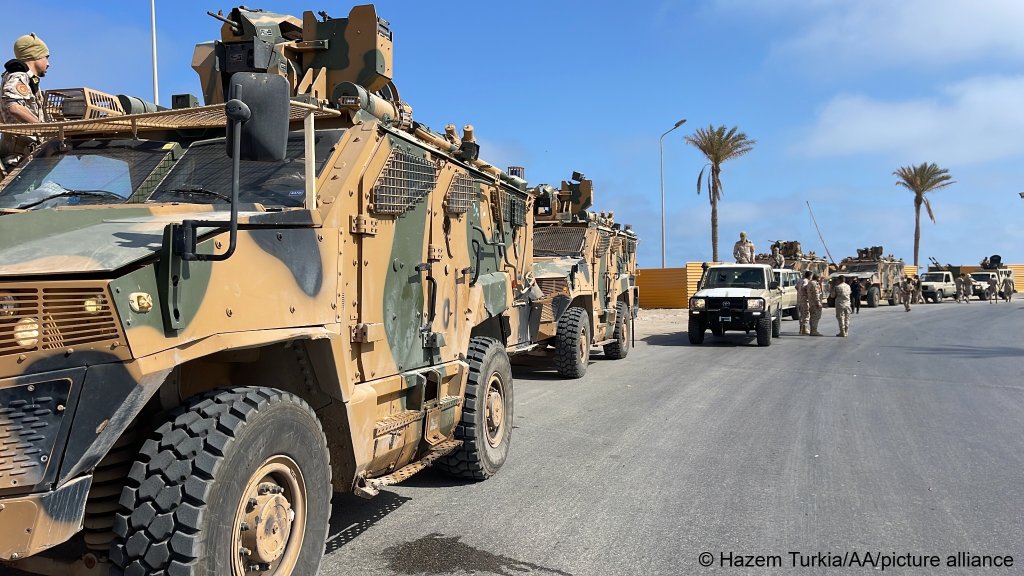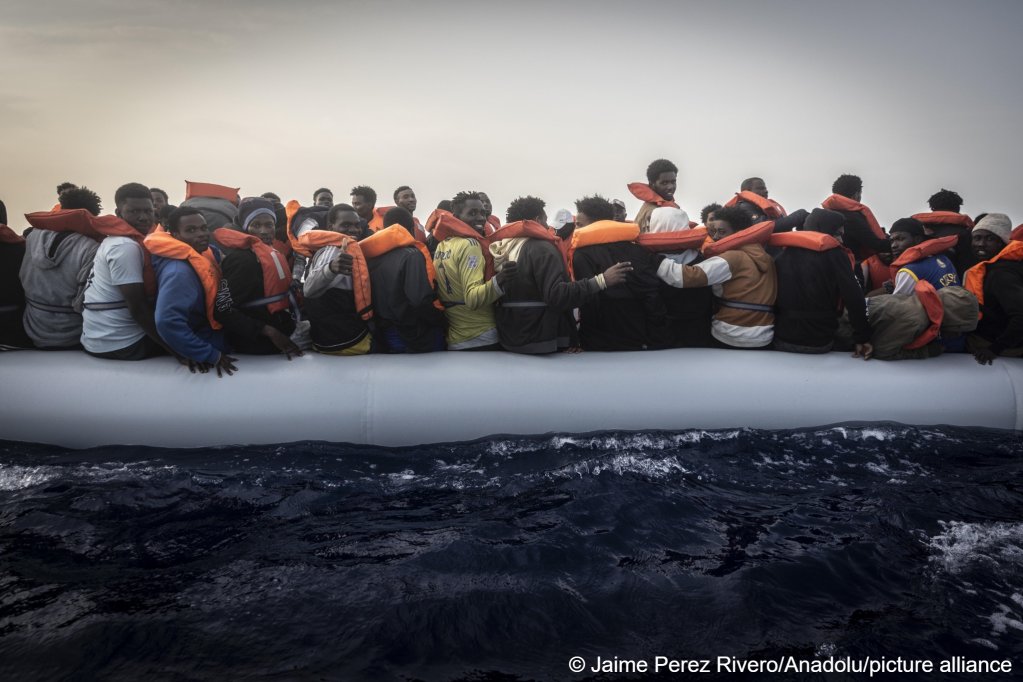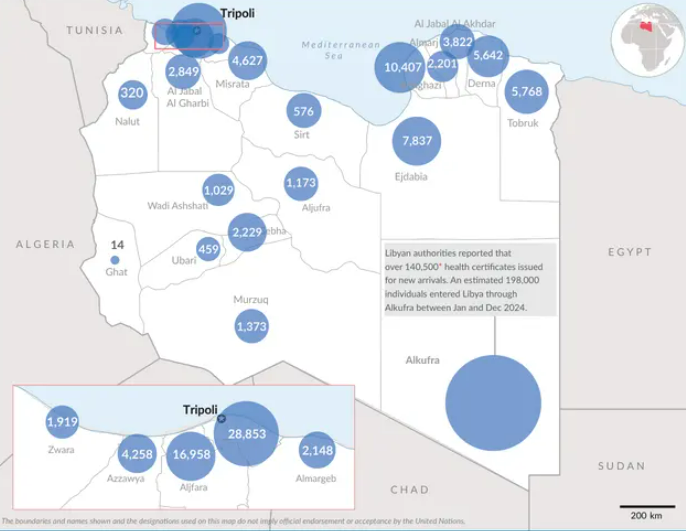Authorities in the eastern part of Libya said they deported more than 700 Sudanese migrants on Friday (July 18). Millions of Sudanese migrants have fled their war-torn country since the latest conflict broke out in April 2023. Hundreds of thousands have made it to Libya, in the hope of an onward journey to Europe.
The Anti-Illegal Immigration Agency in Benghazi announced in a statement on Friday (July 18) that authorities in the eastern part of the country had deported more than 700 Sudanese migrants.
The statement said that some of the migrants were suffering from "infectious diseases" such as hepatitis and AIDS, and that others allegedly had criminal convictions or were sent out of the country for "security reasons," reported the news agency Associated Press (AP).
Authorities in Libya have organized similar mass return programs of Sudanese nationals before. At the end of May, according to a report by UNHCR, "over 500 Sudanese individuals departed from Alkufra to the Triangle border area [the area between Sudan, Chad, and Libya]." The group was reportedly "received by Sudanese military and security personnel."
The Anti-Illegal Immigration Agency stated that they "organized the returns in coordination with the Sudanese community." That group, they said, had "final destinations across Khartoum and other states." It has not yet been reported to where this current group of 700 might have been sent back.
They posted a video of the operation on their Facebook page too.
Read AlsoThe cruel reality of migrant detention and deportation in Libya
Illness and security concerns cited as reasons for deportations
The English-language Libyan Observer also confirmed the deportation, quoting the agency's statement on their Facebook page, which reportedly read "some have tested positive for serious and contagious diseases, including hepatitis and AIDS, and some of whom were arrested for illegal immigration and smuggling, were subject to court rulings, and were deported for security reasons."

On Saturday (July 19), the Libyan Observer said that the Anti-Illegal Immigration Agency had also deported 183 "illegal immigrants, all Egyptian nationals, from the city of Tobruk." The newspaper reported that the migrants were arrested and found to be "without any paperwork or official procedures."
Tobruk is also in the eastern part of the country, and is the base of the Tobruk-led Government of National Stability (GNS) and the Libyan National Army (LNA) commanded by Field Marshal Khalifa Haftar.
Read Also'I ended up homeless' – Sudanese refugees in Ethiopia face hardship
Split between two rival forces
Libya is essentially controlled by two rival forces. The UN-backed government is based mostly in the capital Tripoli and the western part of the country, and forces and militias controlled by Haftar in the east. However, neither side has blanket control of their territories and many rival militias and factions have sprung up in the unstable military, political and economic situation that followed in the wake of the power vacuum left by the downfall of former Libyan dictator Muammar Gaddafi in 2011.

Sudanese people fleeing conflict are at risk of hunger and food insecurity, warned the United Nations’ Food Agency, the World Food Program (WFP), at the beginning of July. Although the majority of displaced Sudanese fled first to camps in neighboring countries like Chad and Egypt, more and more have been finding their way towards Libya, as the situations worsen for them in displacement camps.
"Refugees from Sudan are fleeing for their lives and yet are being met with more hunger, despair and limited resources on the other side of the border," said Shaun Hughes, WFP’s Emergency Coordinator for the Sudan Regional Crisis, at the beginning of this month.
Read AlsoUNHCR concerned over rapidly increasing numbers of Sudanese refugees in Chad
Estimated to be more than 311,000 Sudanese in Libya
In February this year, the UN Refugee Agency (UNHCR) estimated that at least 240,000 Sudanese refugees have arrived in Libya since April 2023. This includes 42,463 individuals who were registered as refugees by the UN post the latest conflict. By late May, this number had risen to more than 311,000.
In total, more than 12 million had been forcibly displaced by conflict. The UN agency estimates that around 43 percent of new arrivals in Libya are from Sudan. UNHCR in Libya called for stronger protection to be afforded to them.

At the UNHCR registration center in Tripoli, in February, the agency said it had 62,126 Sudanese people registered. Many more though will have entered Libya without being able to register, many of them arriving first in the east of the country if they are traveling either directly from Sudan, or Egypt or Chad, which all border Libya in the south-east.
In February, UNHCR underlined that "needs are increasing due to continuous Sudanese arrivals, specifically in health, washing facilities / sanitation, cash, food and shelter." The agency added that refugees show "concerning health conditions, requiring immediate assistance, including food support."
At that time, the agency admitted that its infrastructure was already "overstretched, risking the spread of disease. Immediate support for increased access to water and strengthening public health system, sanitation and hygiene" is required, added the agency.
Read Also'Six million children uprooted in Sudan' estimates Save the Children
'Moving towards coastal cities'
Most of the Sudanese arriving, stated UNHCR, were "moving towards coastal cities" where they hoped to cross the Mediterranean.
UNHCR and the UN migration agency IOM published a map in February, showing where most of the Sudanese were in Libya and underlining that an estimated 198,000 of them entered Libya through the Alkufra border crossing between January and December 2024.

IOM said that it remained "challenging to provide an accurate number of Sudanese refugees" in Libya "due to the ad hoc data shared by authorities, and the vast remote land border with Chad, Egypt and Sudan, combined with movements towards cities along the coast."
In late May this year, UNHCR issued a situation report update on Sudan. In Libya, they wrote that the "ongoing Sudan crisis continues to drive protection and humanitarian concerns." The agency highlighted that 11 Sudanese nationals died in May of dehydration after their vehicle broke down near Alkufra. Women and children were reportedly among those who died.
Read AlsoAfter 2 years of war, Sudan no closer to peace
Fears shared by Sudanese community in Libya
In May, around 400 households crossed from the Zamzam IDP camp towards Libya through Chad.

The UNHCR in Tripoli has set up focus group discussions with Sudanese women at their offices to "explore key protection concerns." Those who participated in the discussions reportedly spoke about "experiences of harassment, particularly in public transportation, workplace discrimination, unpaid labor and abuse at the community level."
Many Sudanese women said they felt they had to restrict their movements in Libya due to fears of insecurity or arrest. High rents and discrimination towards them made it difficult for many to find houses in Libya. Economic hardship was forcing "many children into labor," reported the community.
The suspension and cuts to humanitarian assistance in the country were also affecting the Sudanese community, reported UNHCR.
